Jingqi Tong
OpenNovelty: An LLM-powered Agentic System for Verifiable Scholarly Novelty Assessment
Jan 04, 2026Abstract:Evaluating novelty is critical yet challenging in peer review, as reviewers must assess submissions against a vast, rapidly evolving literature. This report presents OpenNovelty, an LLM-powered agentic system for transparent, evidence-based novelty analysis. The system operates through four phases: (1) extracting the core task and contribution claims to generate retrieval queries; (2) retrieving relevant prior work based on extracted queries via semantic search engine; (3) constructing a hierarchical taxonomy of core-task-related work and performing contribution-level full-text comparisons against each contribution; and (4) synthesizing all analyses into a structured novelty report with explicit citations and evidence snippets. Unlike naive LLM-based approaches, \textsc{OpenNovelty} grounds all assessments in retrieved real papers, ensuring verifiable judgments. We deploy our system on 500+ ICLR 2026 submissions with all reports publicly available on our website, and preliminary analysis suggests it can identify relevant prior work, including closely related papers that authors may overlook. OpenNovelty aims to empower the research community with a scalable tool that promotes fair, consistent, and evidence-backed peer review.
Thinking with Video: Video Generation as a Promising Multimodal Reasoning Paradigm
Nov 06, 2025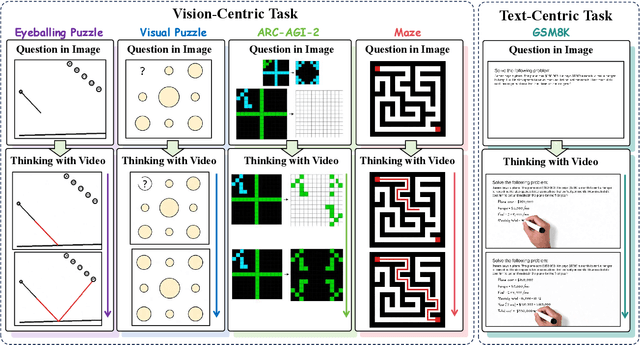
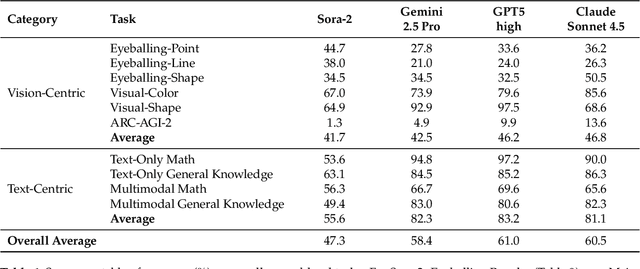
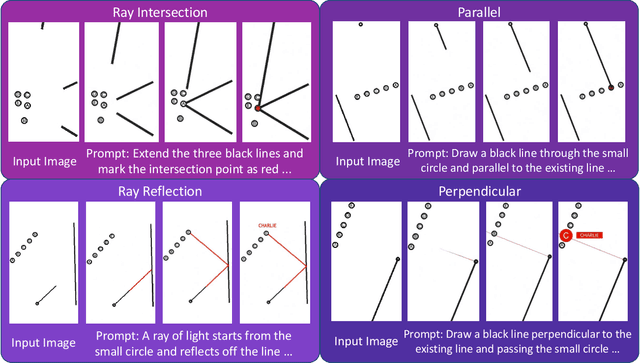
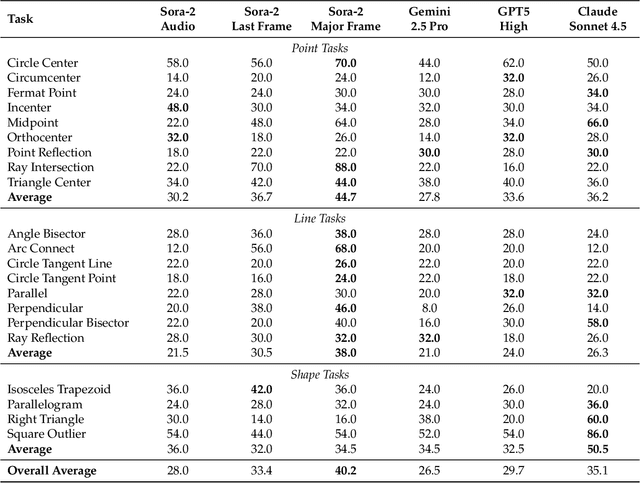
Abstract:"Thinking with Text" and "Thinking with Images" paradigm significantly improve the reasoning ability of large language models (LLMs) and Vision Language Models (VLMs). However, these paradigms have inherent limitations. (1) Images capture only single moments and fail to represent dynamic processes or continuous changes, and (2) The separation of text and vision as distinct modalities, hindering unified multimodal understanding and generation. To overcome these limitations, we introduce "Thinking with Video", a new paradigm that leverages video generation models, such as Sora-2, to bridge visual and textual reasoning in a unified temporal framework. To support this exploration, we developed the Video Thinking Benchmark (VideoThinkBench). VideoThinkBench encompasses two task categories: (1) vision-centric tasks (e.g., Eyeballing Puzzles), and (2) text-centric tasks (e.g., subsets of GSM8K, MMMU). Our evaluation establishes Sora-2 as a capable reasoner. On vision-centric tasks, Sora-2 is generally comparable to state-of-the-art (SOTA) VLMs, and even surpasses VLMs on several tasks, such as Eyeballing Games. On text-centric tasks, Sora-2 achieves 92% accuracy on MATH, and 75.53% accuracy on MMMU. Furthermore, we systematically analyse the source of these abilities. We also find that self-consistency and in-context learning can improve Sora-2's performance. In summary, our findings demonstrate that the video generation model is the potential unified multimodal understanding and generation model, positions "thinking with video" as a unified multimodal reasoning paradigm.
LLMEval-3: A Large-Scale Longitudinal Study on Robust and Fair Evaluation of Large Language Models
Aug 07, 2025Abstract:Existing evaluation of Large Language Models (LLMs) on static benchmarks is vulnerable to data contamination and leaderboard overfitting, critical issues that obscure true model capabilities. To address this, we introduce LLMEval-3, a framework for dynamic evaluation of LLMs. LLMEval-3 is built on a proprietary bank of 220k graduate-level questions, from which it dynamically samples unseen test sets for each evaluation run. Its automated pipeline ensures integrity via contamination-resistant data curation, a novel anti-cheating architecture, and a calibrated LLM-as-a-judge process achieving 90% agreement with human experts, complemented by a relative ranking system for fair comparison. An 20-month longitudinal study of nearly 50 leading models reveals a performance ceiling on knowledge memorization and exposes data contamination vulnerabilities undetectable by static benchmarks. The framework demonstrates exceptional robustness in ranking stability and consistency, providing strong empirical validation for the dynamic evaluation paradigm. LLMEval-3 offers a robust and credible methodology for assessing the true capabilities of LLMs beyond leaderboard scores, promoting the development of more trustworthy evaluation standards.
LLMEval-Med: A Real-world Clinical Benchmark for Medical LLMs with Physician Validation
Jun 04, 2025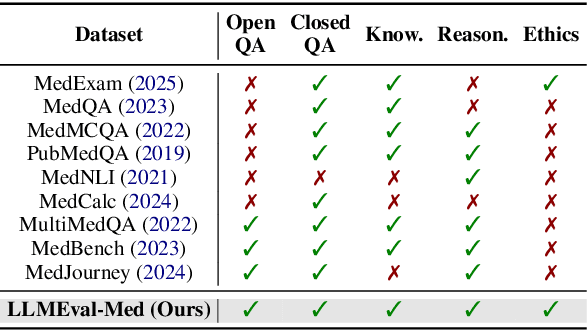
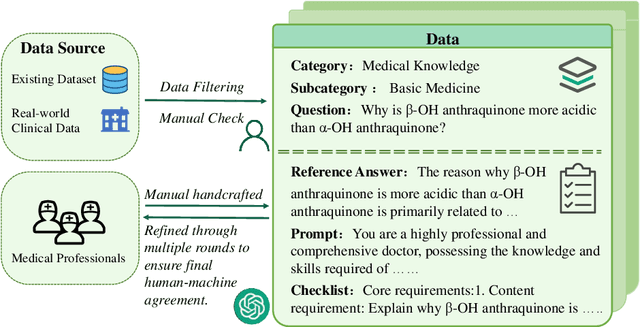

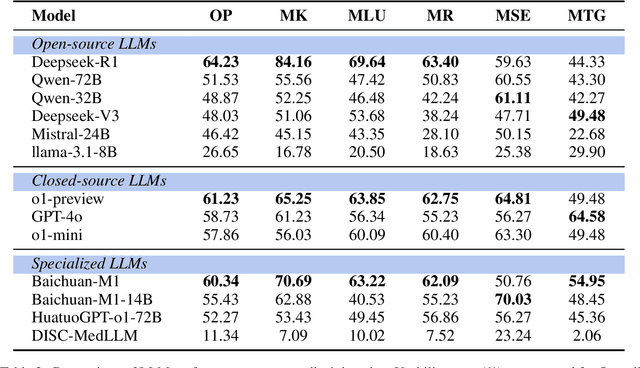
Abstract:Evaluating large language models (LLMs) in medicine is crucial because medical applications require high accuracy with little room for error. Current medical benchmarks have three main types: medical exam-based, comprehensive medical, and specialized assessments. However, these benchmarks have limitations in question design (mostly multiple-choice), data sources (often not derived from real clinical scenarios), and evaluation methods (poor assessment of complex reasoning). To address these issues, we present LLMEval-Med, a new benchmark covering five core medical areas, including 2,996 questions created from real-world electronic health records and expert-designed clinical scenarios. We also design an automated evaluation pipeline, incorporating expert-developed checklists into our LLM-as-Judge framework. Furthermore, our methodology validates machine scoring through human-machine agreement analysis, dynamically refining checklists and prompts based on expert feedback to ensure reliability. We evaluate 13 LLMs across three categories (specialized medical models, open-source models, and closed-source models) on LLMEval-Med, providing valuable insights for the safe and effective deployment of LLMs in medical domains. The dataset is released in https://github.com/llmeval/LLMEval-Med.
Code2Logic: Game-Code-Driven Data Synthesis for Enhancing VLMs General Reasoning
May 20, 2025Abstract:Visual-language Chain-of-Thought (CoT) data resources are relatively scarce compared to text-only counterparts, limiting the improvement of reasoning capabilities in Vision Language Models (VLMs). However, high-quality vision-language reasoning data is expensive and labor-intensive to annotate. To address this issue, we leverage a promising resource: game code, which naturally contains logical structures and state transition processes. Therefore, we propose Code2Logic, a novel game-code-driven approach for multimodal reasoning data synthesis. Our approach leverages Large Language Models (LLMs) to adapt game code, enabling automatic acquisition of reasoning processes and results through code execution. Using the Code2Logic approach, we developed the GameQA dataset to train and evaluate VLMs. GameQA is cost-effective and scalable to produce, challenging for state-of-the-art models, and diverse with 30 games and 158 tasks. Surprisingly, despite training solely on game data, VLMs demonstrated out of domain generalization, specifically Qwen2.5-VL-7B improving performance by 2.33\% across 7 diverse vision-language benchmarks. Our code and dataset are available at https://github.com/tongjingqi/Code2Logic.
Predicting Large Language Model Capabilities on Closed-Book QA Tasks Using Only Information Available Prior to Training
Feb 06, 2025Abstract:The GPT-4 technical report from OpenAI suggests that model performance on specific tasks can be predicted prior to training, though methodologies remain unspecified. This approach is crucial for optimizing resource allocation and ensuring data alignment with target tasks. To achieve this vision, we focus on predicting performance on Closed-book Question Answering (CBQA) tasks, which are closely tied to pre-training data and knowledge retention. We address three major challenges: 1) mastering the entire pre-training process, especially data construction; 2) evaluating a model's knowledge retention; and 3) predicting task-specific knowledge retention using only information available prior to training. To tackle these challenges, we pre-train three large language models (i.e., 1.6B, 7B, and 13B) using 560k dollars and 520k GPU hours. We analyze the pre-training data with knowledge triples and assess knowledge retention using established methods. Additionally, we introduce the SMI metric, an information-theoretic measure that quantifies the relationship between pre-training data, model size, and task-specific knowledge retention. Our experiments reveal a strong linear correlation ($\text{R}^2 > 0.84$) between the SMI metric and the model's accuracy on CBQA tasks across models of varying sizes (i.e., 1.1B, 1.6B, 7B, and 13B). The dataset, model, and code are available at https://github.com/yuhui1038/SMI.
LLaMA-MoE: Building Mixture-of-Experts from LLaMA with Continual Pre-training
Jun 24, 2024



Abstract:Mixture-of-Experts (MoE) has gained increasing popularity as a promising framework for scaling up large language models (LLMs). However, training MoE from scratch in a large-scale setting still suffers from data-hungry and instability problems. Motivated by this limit, we investigate building MoE models from existing dense large language models. Specifically, based on the well-known LLaMA-2 7B model, we obtain an MoE model by: (1) Expert Construction, which partitions the parameters of original Feed-Forward Networks (FFNs) into multiple experts; (2) Continual Pre-training, which further trains the transformed MoE model and additional gate networks. In this paper, we comprehensively explore different methods for expert construction and various data sampling strategies for continual pre-training. After these stages, our LLaMA-MoE models could maintain language abilities and route the input tokens to specific experts with part of the parameters activated. Empirically, by training 200B tokens, LLaMA-MoE-3.5B models significantly outperform dense models that contain similar activation parameters. The source codes and models are available at https://github.com/pjlab-sys4nlp/llama-moe .
Exploring the Compositional Deficiency of Large Language Models in Mathematical Reasoning
May 05, 2024Abstract:Human cognition exhibits systematic compositionality, the algebraic ability to generate infinite novel combinations from finite learned components, which is the key to understanding and reasoning about complex logic. In this work, we investigate the compositionality of large language models (LLMs) in mathematical reasoning. Specifically, we construct a new dataset \textsc{MathTrap}\footnotemark[3] by introducing carefully designed logical traps into the problem descriptions of MATH and GSM8k. Since problems with logical flaws are quite rare in the real world, these represent ``unseen'' cases to LLMs. Solving these requires the models to systematically compose (1) the mathematical knowledge involved in the original problems with (2) knowledge related to the introduced traps. Our experiments show that while LLMs possess both components of requisite knowledge, they do not \textbf{spontaneously} combine them to handle these novel cases. We explore several methods to mitigate this deficiency, such as natural language prompts, few-shot demonstrations, and fine-tuning. We find that LLMs' performance can be \textbf{passively} improved through the above external intervention. Overall, systematic compositionality remains an open challenge for large language models.
 Add to Chrome
Add to Chrome Add to Firefox
Add to Firefox Add to Edge
Add to Edge